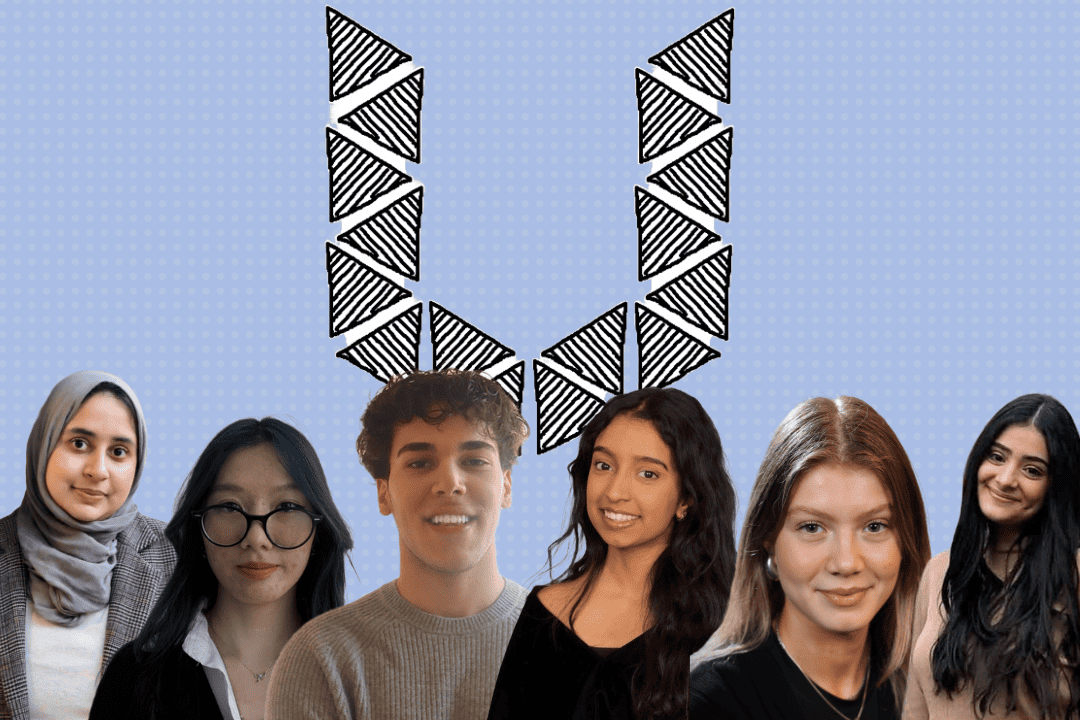On March 11, the University of Toronto Students’ Union (UTSU) announced the tentative results of the union’s spring elections, which will determine the union’s leadership for the 2024–2025 academic year.
Voters elected Shehab Mansour as president, beating out Aidan Thompson and Jake Barton with 49.1 per cent of the vote. For the vice-president (VP) positions, students elected Elizabeth Shechtman as VP finance and operations, Avreet Jagdev as VP public and university affairs (VP PUA), Erica Nguyen as VP professional faculties, Sakeena Mohammad as VP equity, and Tala Mehdi as VP student life.
The voting period ran from March 4 at 9:00 am until March 7 at 5:00 pm. Within the voting period, 5,476 students cast their ballots online — a voter turnout of 13.1 per cent of those eligible to vote, an increase of two percentage points from the approximately 11 per cent who cast their ballots in the 2023 spring elections.
Referenda and the board of directors
The UTSU student aid program (SAP) levy increase passed with a 60 per cent approval vote. SAP assists students with housing, transportation and academic costs by allowing them to request up to $500. UTSU members will now pay five dollars a semester, up two dollars from the previous three-dollar levy.
Students also passed the Sexual Education Centre (SEC) levy increase with a 60.4 per cent approval vote, marking the first increase to the SEC’s levy funding since 1996. The SEC provides students with free safe sex supplies, in-person peer counselling, and information sessions at their office at 230 College Street, Room 326. In 1996, students passed a referendum to establish a 25-cent levy for the SEC. With this increase, students will now pay 75 cents a semester.
Fifteen students ran for Directory at Large of the UTSU Board of Directors (BOD). Rayan Awad Alim, Alice Ferguson-O’Brien, Daisy Zhao, Krishi Shah, Lilah Williamson, Sophia Mitonides, Diego Moura Panario, Jane Lee, Noah Goldstein, and Ron Ulitsky secured the 10 spots available.
The current BOD will determine whether to ratify the election results at its next meeting scheduled for March 17.
The leadup
On March 4, student activism groups Climate Justice UofT (CJ UofT) and Tkaron:to Students in Solidarity with Palestine (TSSP) issued a joint statement on Barton and Thomspson, two of the candidates for the president position. The organizations wrote that they decided to issue the post to clarify comments that Barton and Thompson made during the March 1 UTSU candidates debate moderated by The Varsity.
Thompson’s campaign platform listed on his website included creating a “dedicated student advocacy fund for student organizations,” specifically mentioning CJ UofT and TSSP. However, Thomspon claimed in an email to The Varsity that he only posted this platform after the CJ UofT and TSSP post went up. Barton’s website also mentioned pressuring the university to adopt recommendations made by CJ UofT in a recent report discussing the university’s ties to fossil fuel companies and demands released by TSSP.
During the debate, TSSP member and VP equity candidate Aviral Dhamija asked Thompson and Barton about an alleged lack of support for TSSP from the UTSU — where Thompson serves as VP PUA — and the New Democratic Party (NDP), noting that Barton serves as president of the U of T NDP, a student club. “Yet come election season, these demands are suddenly critical,” said Dhamija.
In response, Thompson said that the UTSU’s statement on Gaza was “lacklustre,” and said that it ended up that way after he tried to come to a consensus among the executive team. He added that he hopes his proposed advocacy fund would help resolve issues faced by TSSP and other advocacy groups.
Barton said he would do “everything in [his] power” if elected to advocate for Palestinian solidarity and highlighted that the UofT NDP doesn’t have power over the activities of the federal party.
In the March 4 post, CJ UofT and TSSP stated that they did not know that Barton and Thompson would be using the organizations’ names to further their campaigns, and wrote that they felt upset at Barton and Thompson’s efforts to “greenwash” their campaigns by invoking the advocacy groups’ names.
In an email to The Varsity, Barton wrote that he felt “shocked and deeply hurt” by the post and its allegations against his “long standing and documented” commitment to both Palestine and climate activism. He acknowledged that he hadn’t spoken to the groups before the debate, but that he had been involved with the groups in a limited capacity throughout the year. He wrote that he has since spoken to the TSSP, and acknowledges that he should have spoken to them before mentioning them in his campaign.
In an email to The Varsity, Thompson wrote that he only ever referenced CJ UofT in his platform and during the debate, which he believed was warranted given that he had worked with CJ UofT during the summer last year when it collaborated with the UTSU on advocacy against the Royal Bank of Canada. He wrote that he did not reference TSSP in his campaign before the CJ UofT TSSP post. He pointed to a recent story on Instagram where he wrote at length about “[allegations] flying around with respect to elections.”
The post also referenced an Instagram story that Barton posted in November 2023, which included a photo of poorly-maintained urinals in a Robarts Library bathroom and text with a caption saying that students should donate money to Robarts bathrooms instead of to Gaza. In a statement to The Varsity, Barton expressed his deepest apologies for the joke and stated that Gaza should never have been included in the post.
Editor’s note (March 11, 2024): This article was updated to clarify that Thompson’s website was not posted before the CJ UofT TSSP post went up.



No comments to display.